|
You are here: Center BATS > Projects > Indo-Swiss
Indo-Swiss Research Collaboration
India and Switzerland have a long-standing collaboration in biotechnology (Indo-Swiss
Collaboration in Biotechnology, ISCB). The collaboration is a project of the
Swiss Agency for Development and Cooperation (SDC). For the period 1999 to 2004
a new ISCB-programme has been developed. The Agency BATS has
actively contributed
to the formulation of the objectives of the programme and to the evaluation
of research proposals, providing expertise in transsectoral topics, i.e. biosafety,
regulation, technology assessment.
Abstract
Need Assessment Training Initiative
For the assessment of the impacts of Golden Rice an approach was chosen that
could have a model character for similar projects. A principal goal is to establish
capacity for technology assessment (TA) in India. The Centre for Biosafety
Assessment, Technology and Sustainability (BATS), Basel, has organized the
TA knowledge transfer. Two Indian scientists from the
National Centre for
Agricultural Economics and Policy Research (NCAP), New Delhi
and National Institute of
Nutrition (NIN), Hyderabad, are being trained in the management of TA
projects at BATS. TA/NA methodology covers defining the scope for the study,
assessment issues, valuation criteria, project organization issues etc.,
Additionally, the initiative relates to a larger framework of capacity
building for the valuation of new technologies with respect to their economic,
ecological and social benefits and potential risks particularly in developing
countries and countries in transition. A key aim is to enable the trainees
to transfer knowledge, concepts and skills that are appropriate and
applicable to the recipient country. A particular intention
is to set up an in-country capacity in order to establish TA as a tool for the
assessment of future technology transfer and implementation projects.
 Dr.P.Adhiguru done his Ph. D from
Indian Agricultural Research Institute, New Delhi
and is presently working as Scientist in
NCAP, New Delhi. Some of his
significant research projects include “Agriculture Based
Interventions for Sustainable Nutritional Security",
‘Impact of National Agricultural Research System in India”. He was
involved in “Impact assessment on sustainable rainfed project”
sponsored
by World Bank. Some other research areas of interests are, integrated pest
management, biosafety assessment, biotechnology,
ex-anti assessment of technology,
technology forecasting, technology/institutional interventions, Information
and Communication Technology applications, e-learning, personnel management
in research organizations, gender issues, agricultural extension methodology
etc. He has published many articles in journals, chapters in books. The significant
ones are project based Policy Paper on Agricultural Interventions for Sustainable
Nutritional Security and a forthcoming article on “Innovative Institutions
in technology dissemination: role of information technology”. Dr.P.Adhiguru done his Ph. D from
Indian Agricultural Research Institute, New Delhi
and is presently working as Scientist in
NCAP, New Delhi. Some of his
significant research projects include “Agriculture Based
Interventions for Sustainable Nutritional Security",
‘Impact of National Agricultural Research System in India”. He was
involved in “Impact assessment on sustainable rainfed project”
sponsored
by World Bank. Some other research areas of interests are, integrated pest
management, biosafety assessment, biotechnology,
ex-anti assessment of technology,
technology forecasting, technology/institutional interventions, Information
and Communication Technology applications, e-learning, personnel management
in research organizations, gender issues, agricultural extension methodology
etc. He has published many articles in journals, chapters in books. The significant
ones are project based Policy Paper on Agricultural Interventions for Sustainable
Nutritional Security and a forthcoming article on “Innovative Institutions
in technology dissemination: role of information technology”.
He has undergone training in the areas like Participatory Rural Appraisal (PRA)
methodology, project management for research and development,
rural and agricultural
development, organizational behavior, educational technology and administrative
rocedures, scientific information management. Further, he has participated
n an International course on Agricultural extension and training methodology
ponsored by Japan International Co-operation Agency and also a training workshop
n search conference and scenario building as a tool in Technology Assessment
Need Assessment methodology organized by European Union.
He has computer expertise
in Analytical packages (e.g. SPSS, Relational Data Base Management, (e.g Access,
ORACLE), Web Programming and Internet Technologies, MS Office. He is member
secretary, Publication Committee, and also for Institutional Change theme area
of the Centre.
 Dr. Harikumar, a public
health specialist in the division of field
studies of the National Institute of Nutrition, has experience in
project planning and implementation of large community trials on double
fortified salt, for the control of Iodine deficiency anaemia and Iodine
deficiency disorders. The other areas covered are “Assessment
of bio-effect of sugar fortified with vitamin A, “Evaluation of national
nutritional programmes on vitamin-A and iron and folic acid supplementation”
and “Evaluation of Integrated child development services” and the
“Mid-day meals programme” in India. He acquired skills of assessment
of nutrition status by diet surveys, anthropometry, clinical malnutrition and
blood chemistry. He is trained in management of primary health care, Surveillance,
epidemic preparedness and the response and project planning and implementation.
His contributions are scientific papers on “Nutrition profile of Indians,
Mid-day meal programme, Drought in Gujarat state”. He is also a faculty
member of the post graduate training programme on “Applied human
nutrition”, conducted by the Institute. Dr. Harikumar, a public
health specialist in the division of field
studies of the National Institute of Nutrition, has experience in
project planning and implementation of large community trials on double
fortified salt, for the control of Iodine deficiency anaemia and Iodine
deficiency disorders. The other areas covered are “Assessment
of bio-effect of sugar fortified with vitamin A, “Evaluation of national
nutritional programmes on vitamin-A and iron and folic acid supplementation”
and “Evaluation of Integrated child development services” and the
“Mid-day meals programme” in India. He acquired skills of assessment
of nutrition status by diet surveys, anthropometry, clinical malnutrition and
blood chemistry. He is trained in management of primary health care, Surveillance,
epidemic preparedness and the response and project planning and implementation.
His contributions are scientific papers on “Nutrition profile of Indians,
Mid-day meal programme, Drought in Gujarat state”. He is also a faculty
member of the post graduate training programme on “Applied human
nutrition”, conducted by the Institute.
|



 Dr.P.Adhiguru done his Ph. D from
Indian Agricultural Research Institute, New Delhi
and is presently working as Scientist in
Dr.P.Adhiguru done his Ph. D from
Indian Agricultural Research Institute, New Delhi
and is presently working as Scientist in
 Dr. Harikumar, a public
health specialist in the division of field
studies of the National Institute of Nutrition, has experience in
project planning and implementation of large community trials on double
fortified salt, for the control of Iodine deficiency anaemia and Iodine
deficiency disorders. The other areas covered are “Assessment
of bio-effect of sugar fortified with vitamin A, “Evaluation of national
nutritional programmes on vitamin-A and iron and folic acid supplementation”
and “Evaluation of Integrated child development services” and the
“Mid-day meals programme” in India. He acquired skills of assessment
of nutrition status by diet surveys, anthropometry, clinical malnutrition and
blood chemistry. He is trained in management of primary health care, Surveillance,
epidemic preparedness and the response and project planning and implementation.
His contributions are scientific papers on “Nutrition profile of Indians,
Mid-day meal programme, Drought in Gujarat state”. He is also a faculty
member of the post graduate training programme on “Applied human
nutrition”, conducted by the Institute.
Dr. Harikumar, a public
health specialist in the division of field
studies of the National Institute of Nutrition, has experience in
project planning and implementation of large community trials on double
fortified salt, for the control of Iodine deficiency anaemia and Iodine
deficiency disorders. The other areas covered are “Assessment
of bio-effect of sugar fortified with vitamin A, “Evaluation of national
nutritional programmes on vitamin-A and iron and folic acid supplementation”
and “Evaluation of Integrated child development services” and the
“Mid-day meals programme” in India. He acquired skills of assessment
of nutrition status by diet surveys, anthropometry, clinical malnutrition and
blood chemistry. He is trained in management of primary health care, Surveillance,
epidemic preparedness and the response and project planning and implementation.
His contributions are scientific papers on “Nutrition profile of Indians,
Mid-day meal programme, Drought in Gujarat state”. He is also a faculty
member of the post graduate training programme on “Applied human
nutrition”, conducted by the Institute.
 antibodies on hand
antibodies on hand 